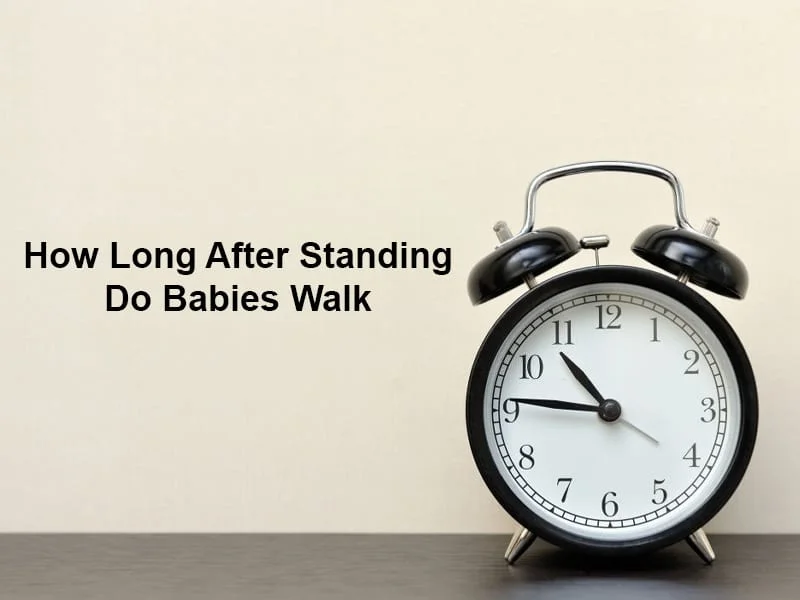Exact Answer: 2-4 Months
A baby standing for the first time on its own is a happy moment for the baby as well as for the parents. A baby standing on their own can also be considered as an indication that soon, the baby might start walking with support and then without any support. At around six to nine months of age, an average baby starts to stand first with support, and then on their own without any support.
However, every parent waits for the time when their baby would walk without support. In such a case, one may wonder how long after standing does a baby starts to walk.

How Long After Standing Do Babies Walk?
When a baby is born, from their birth to a few months, babies only lay down and kick their legs around. They kick their legs like running an air bike. Soon enough a starts to stand with support. Eventually, they start standing without help of any kind of support. This happens around when a baby is 6 to 9 months old. Around the same age, the baby also starts to crawl as well.
From 9 months onwards, on average it takes a baby 2 to 4 months to start walking with support. At this time, the baby first takes small steps with help of support, eventually they start to walk more with support. Then the baby starts to take smaller steps without the support and eventually the baby starts walking without the support of anything. However, this is not completely fixed. At times some babies start to walk when they are 8 to 9 months while some babies take a long time to start to walk. Some babies start walking as late as up to two years. However, it is good to consult a doctor if a baby does not start to walk at the age of 18 months even without support.
Moreover, parents can help babies while they start to stand up by doing several kinds of exercises with the babies. This way baby’s muscles start to become stronger and they start moving faster.

| Scale | Time after standing to walk |
| Average | 2 to 4 months |
| Maximum | 10 months |
Why Baby Takes That Long To Walk After Standing?
A baby’s body is very fragile when they are born. It takes a long time for the body to become strong enough to carry the weight on its own. Henceforth, it takes a baby about a year or more to start walking.
As said before, at the first step, a baby starts kicking. This is a good sign that baby’s legs are moving. Eventually, a baby starts grabbing or holding on to things to take support to stand up. This is also a really good sign that baby’s legs are healthy. A baby stands with support when they are about six to nine months old. After that, the baby starts to take tiny steps grabbing a chair, a couch, or anything tall enough in their reach. There are times, when the baby may fall but that is completely fine as every baby falls while trying to walk.
After taking small steps with the help of grabbing something, the baby starts to take bigger steps, and eventually, they take steps without any support. On average, it takes 2 to 4 months for a baby to start walking after they learn to stand.

What parents can do is help their baby with walking by giving the baby massage, making them do walking exercises, and keep them in a healthy environment. Moreover, parents can also buy walker that assists baby in walking. These things will keep the baby healthy and can make him strong enough to start walking early.
Conclusion
Babies are very fragile and need time to grow. When a baby is born, its muscles and bones are not grown enough to carry the weight of the body. As the baby grows, their muscles and bones grow strong and they start to stand with support then eventually step by step they start walking.
No fixed time guarantees that a baby will be able to walk on a certain date, but usually, a baby starts to stand up with support when they are about 6 to 9 months old, and eventually after 2 to 4 months after standing a baby starts to walk.